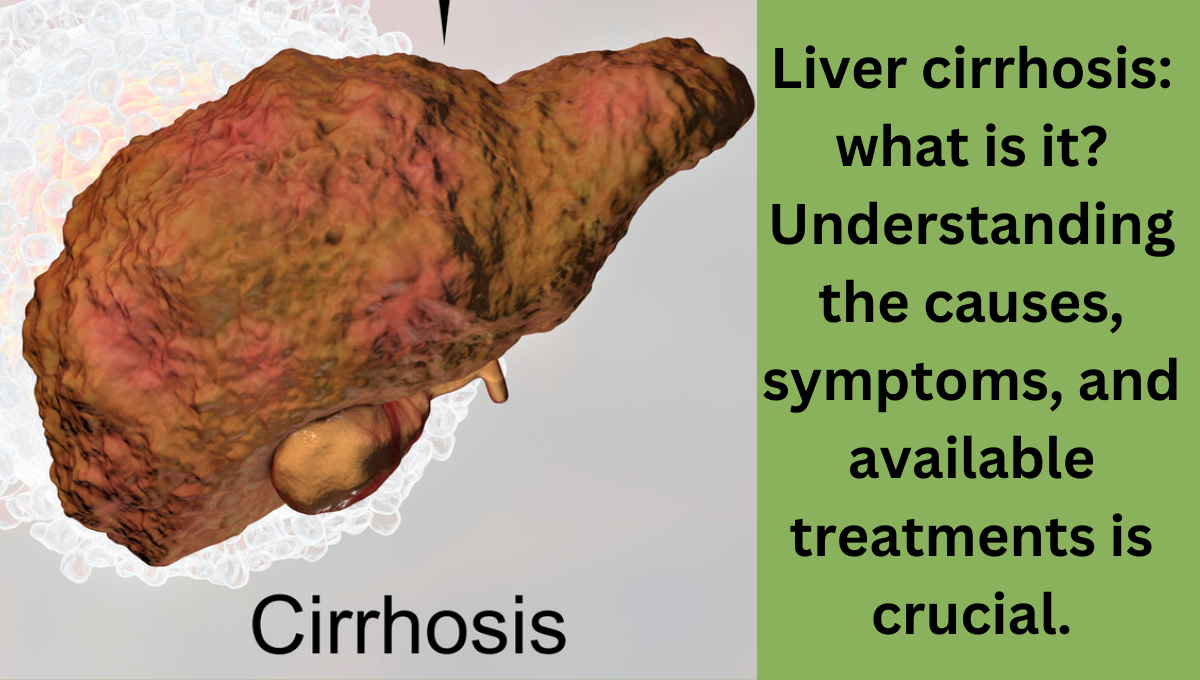Liver cirrhosis: what is it? Understanding the causes, symptoms, and available treatments is crucial.
The introduction
As cirrhosis intensifies, it disrupts the liver’s structure and function, leading to the replacement of healthy liver tissue with scar tissue. This illness may significantly impact the liver’s capacity to control blood coagulation, filter toxins, and generate vital nutrients. Awareness of the cirrhosis’s causes, progression, and available treatments can encourage people to take charge of their liver’s health.
Cirrhosis: What Is It?
The formation of scar tissue in place of the liver’s natural tissue distinguishes cirrhosis, a late stage of liver injury. Serious health issues frequently result from this scarring, which stops the liver from carrying out its vital tasks. Early identification is crucial because the liver’s ability to regenerate itself diminishes as cirrhosis worsens.

Phases of Cirrhosis
The progression of cirrhosis unfolds in stages:
The liver can still carry out the majority of its tasks in compensated cirrhosis, despite the presence of liver damage and the lack of symptoms.
Decompensated Cirrhosis: This condition impairs the liver’s ability to operate, resulting in severe symptoms and problems such as disorientation, fluid buildup, and jaundice.
The reasons behind cirrhosis
Cirrhosis can be caused by a number of factors:
Chronic Alcohol Use: Long-term excessive alcohol use is one of the main causes of liver cirrhosis.
Viral infections that harm liver cells, such as hepatitis B and C, can result in cirrhosis if left untreated.
Non-alcoholic fatty liver disease (NAFLD), a type of liver disease, is associated with diabetes and other metabolic disorders.
Genetic Conditions: Liver damage can result from hepatocellular disorders such as Wilson’s disease and hemochromatosis.
Risk Elements for Hemorrhage
Although some people are more susceptible because of their genetic makeup, lifestyle decisions also have a big impact.
Lifestyle factors: Poor diet, inactivity, and excessive alcohol consumption can all lead to cirrhosis.
Certain hereditary disorders raise the chance of cirrhosis even when no other risk factors are present.
Criteria for Cirrhosis
The disease stage influences the symptoms of cirrhosis.
Fatigue, nausea, and minor abdominal pain are the initial symptoms.
Advanced symptoms include disorientation from the accumulation of toxins, ascites (swelling of the legs and abdomen), and jaundice (yellowing of the skin and eyes).
The diagnosis of cirrhosis is made using a number of tests:
Check bilirubin levels, liver enzymes, and other indicators with blood tests.
Imaging Studies: Structural alterations may be visible on CT scans and ultrasounds.
Liver Biopsy: In certain situations, a direct evaluation of the liver tissue requires a biopsy.
Problems with Cirrhosis
Serious consequences may result from cirrhosis:
The portal vein of the liver has elevated blood pressure, which is known as portal hypertension.
Ascites: An infection may result from a buildup of fluid in the belly.
Hepatic encephalopathy is a buildup of toxins that affects brain function.
Cirrhosis Treatment Options
Symptom management and reducing the disease’s progression are the main goals of cirrhosis treatment.


Changes in Lifestyle: Steer clear of alcohol, eat a healthy diet, and work out frequently.
Medication includes antibiotics for infections, diuretics to control fluid retention, and drugs for hepatic encephalopathy.
Transplanting the liver may be the only choice in extreme circumstances.
Coping with Cirrhosis
Prioritizing lifestyle and mental health is essential for managing cirrhosis.
A balanced diet promotes liver function, whereas low-salt diets help control fluid retention.
Support Systems: Managing lifestyle changes and emotional stress requires the assistance of family members and professionals.
Cirrhosis Prevention
Even though cirrhosis cannot be prevented, several measures can lower the risk:
Healthy Lifestyle Options: Eat a diet that is beneficial for your liver, restrict alcohol consumption, and exercise frequently.
Safe practices and vaccination against hepatitis B contribute to the prevention of hepatitis infections.
Life Expectancy and Prognosis
The stage of cirrhosis and how well it responds to treatment determine the prognosis. A transplant may be necessary in more severe cases; however, early management can enhance results.
Alternative and complementary medicine
Alternative treatments for certain patients include:
Herbal Supplements: Several supplements support liver function, but you should only use them carefully and under a doctor’s guidance.
Typical misconceptions about cirrhosis
There are several common misconceptions about cirrhosis.
Myth 1: Alcohol alone is susceptible to cirrhosis.
Myth 2: There’s no way to control cirrhosis once it starts.
Myth 3. It is impossible to reverse all liver damage.
Final Thoughts
Cirrhosis is a complicated illness that impacts not just the liver but also general well-being and life quality. By being aware of the signs, dangers, and available treatments, people can take action to control or avoid this dangerous illness. Proactive behavior can significantly impact results and improve quality of life, particularly when it comes to lifestyle decisions.
FAQ-
1. Is it possible to reverse cirrhosis?
It is possible to treat cirrhosis in its early stages, but severe scarring is frequently incurable.
2. What is the average lifespan for someone with cirrhosis?
Complications and stage influence life expectancy; early treatment improves prognosis.
3. Is drinking alcohol always linked to cirrhosis?
Hepatitis and genetic disorders are among the many causes of cirrhosis.
4. Is it possible to completely prevent cirrhosis through diet?
Although a nutritious diet is beneficial, genetic predispositions and other lifestyle choices also matter.
5. What is the rate at which cirrhosis advances?
Individual health characteristics, lifestyle, and causation all influence progression.

